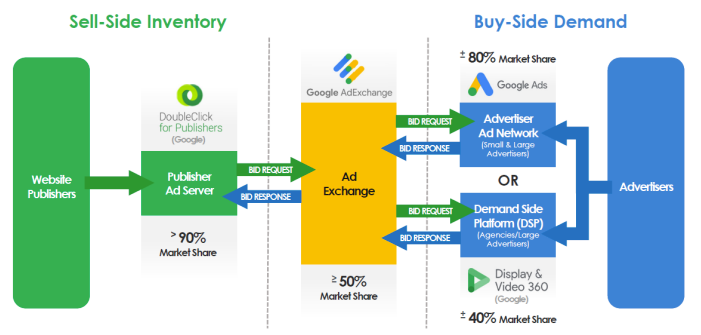DOJ v. Google, Get Down with OPC, Yahoo Search Comeback?

DOJ: Break Up Google Ad Manager
The US Justice Department (DOJ) has now filed two antitrust lawsuits against Google. The first, in 2020, covers search and paid search. That will go to trial later this year. Yesterday it filed a new action that focuses on Google's alleged control of display advertising (complaint). The government says "Google’s dominance across the ad tech industry is unparalleled." It claims Google sought to acquire, "neutralize or eliminate ad tech competitors" and force publishers and advertisers to use its products, while preventing them from using competitors' offerings. Google is also accused of "manipulating auction mechanics" to prevent competition and extract more revenue. DOJ seeks damages, injunctions and the break up and divestiture of Google Ad Manager. Google responded that the online ad industry is highly competitive, citing Amazon, Apple, TikTok and others. Google argues it helps publishers and gives them more, not less, choice. Finally, as always, hurting Google would harm "innovation" in the broader online ad industry.

Our take:
- The DOJ cites internal Google emails and detailed examples (DOJ video: 10:37) that make the company look like a bad actor, with intent.
- The company and its allies are using macroeconomic challenges as part of their argument: Google just laid people off; this isn't fair.
- The DOJ's arguments and evidence appear fairly strong. Google may not entirely lose, but it won't emerge unscathed. Perceptions of Google have changed, making an unfavorable outcome more likely.
AI: Get Down with OPC
Worse than the fact that many CNET AI content pieces were factually inaccurate is the new revelation of extensive plagiarism. This obviously wasn't intentional but it may not have been avoidable, given how LLMs are trained. Both generative-image AI and text-based models are trained on internet data, most of which is probably copyrighted or somebody's intellectual property. In other words, the training data sets are inherently other people's content (OPC), being used without permission. That creates a potentially major legal headache for AI vendors. For example, Getty images is suing Stable Diffusion, after finding its watermark in multiple image outputs. And three individual artists are also suing the company and rivals for using their art without permission. There's yet another suit targeting AI-code generation. More litigation is coming.

Our take:
- The Getty case is relatively easy because there's direct evidence of copyright infringement. Other cases are potentially harder to win.
- Courts may decide AI outputs are not copyright violations because (in most cases) there's no direct evidence of IP theft.
- It could go the other way too, forcing AI vendors to pay fees to content sources. But that creates big problems: who is a content source?
Yahoo Search Comeback?
You probably don't think that much about Yahoo these days but CEO Jim Lanzone (Ask's CEO back in the day) and private equity owner Apollo Global Management are working to rebuild the brand. Barry Schwartz saw a recent tweet from Yahoo Search, implying a relaunch or upgrade of Yahoo Search. Given where Yahoo is today, one might be inclined to simply dismiss it. Yahoo currently controls about 2.6% of the search market in the US (less globally). And it's hard to imagine what Yahoo might do to regain additional share. But Lanzone was the architect behind Ask 3D, a very innovative UI that launched in 2007 and was a better version (at the time) of Google's Universal Search. With little (revenue) to lose, Yahoo is in a position to take some chances. Let's see what they do.
Just popping in to remind everyone that we did search before it was cool.
— Yahoo Search (@YahooSearch) January 20, 2023
BRB making it cool again.
Our take:
- Today, Yahoo's SERP is basically just a more cluttered version of Google.
- Some sort of tepid, incremental change won't help Yahoo. Whatever they do needs to be dramatic or even radical.
- But this comes at a good time. People are probably more open to Google alternatives than at any time since 2009, when Yahoo "gave up."
Recent Analysis
- Near Memo episode 97: Apple Business Connect failings, Local SEO said to be "fad" in CallRail survey, technical SEOs don’t get no respect.
Short Takes
- Google showing "double justifications" in local results.
- The post-review (post Google) local customer journey.
- How to add videos to reviews on Google.
- Content Ideas start appearing in Google Search Console.
- Meta's main AI guy: ChatGPT not very innovative.
- Many TikTok influencers not making much on the platform.
- Low-paid workers in Kenya making ChatGPT safe for everyone else.
- Microsoft search ad revenue was up 10% in latest quarter.
- Product-led SEO vs. marketing-led SEO: what's the difference?
- Shopify raises its prices because, of course.
- Walmart Business is a (relatively) new B2B shopping site.
- See Apple's new nearly 6-minute "Ted Lasso" privacy commercial.
- Brand KPIs suffer if ads surrounded by "misaligned content."
- Cal Newport: Context shifting is killing employee productivity (NYT).
- Moz: Why ChatGPT won't replace Google – yet.
Listen to our latest podcast.

How can we make this better? Email us with suggestions and recommendations.

